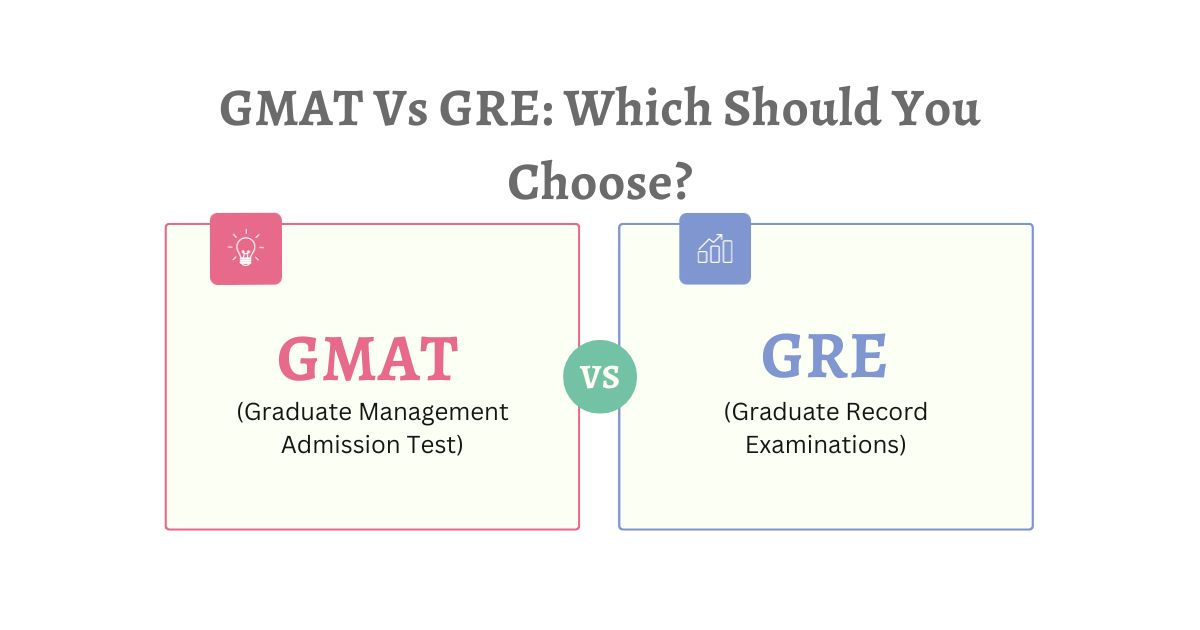
GMAT Vs GRE: Which Should You Choose?
Selecting the appropriate standardized test often tends to be a big concern for potential candidates who wish to pursue their MBA degree. The GMAT and GRE are the two commonly used examinations for business school admission.
I. Objective and Embrace:
GMAT:
Historically, admissions to MBA programs have mandated the GMAT score as a indicator of a candidate’s academic aptitude. the GMAT consists of the Quantitative, verbal, analytical writing and integrative reasoning sections which test a candidates abilites in these sections. The GMAT is preferred for admission to several world-class MBA schools. This includes INSEAD and Harvard Business School, among many others.
GRE:
Although the GRE was initially designed for a wider variety of graduate programs, it has since found widespread use in business schools, particularly post the Covid-19 pandemic. It assesses analytical writing, quantitative thinking, and reasoning based on words. While the GMAT is more narrowly focused on business, more and more business schools are accepting GRE results, giving applicants more options.
Take into account:
The GMAT’s business-specific focus makes it a good option for those aiming to get an MBA or similar graduate program in business. Conversely, the GRE is flexible enough to let you apply to graduate programs in fields other than business.
Scholarships decision tend to favor the GMAT over the GRE. So if you are seeking financial aid to pursue your MBA, then the GMAT exam will be a better bet.
II. The Format and Content of the Exam:
GMAT:
Analytical Writing Assessment (AWA) Quantitative, Verbal, and Integrated Reasoning (IR) comprise the four parts of the GMAT. The computer-adaptive nature of the exam means that it changes in difficulty depending on how well you did in earlier parts.
GRE:
An unscored research portion or an extra unscored Verbal or Quantitative component, two sections of Verbal Reasoning, two pieces of Quantitative Reasoning, and an analytical writing section comprise the six parts of the GRE. Both the GMAT and the GRE are computer-adaptive tests.
Take into account:
Though they may place different amounts of emphasis on particular abilities and question kinds, the two exams assess comparable abilities. Think about how well you do on tests that need mathematical and verbal reasoning, and then choose the one that best suits your skills.
III: Verbal and Quantitative Data:
GMAT:
Both the quantitative and verbal parts of the GMAT are structured to evaluate abilities critical for doing well in business school. The verbal portion covers reading comprehension, critical thinking, and sentence correction, while the quantitative part focuses on data sufficiency and problem-solving.
GRE:
The Quantitative and Verbal parts of the GRE cover more ground, with questions covering reading comprehension, vocabulary, algebra, geometry, and basic math concepts. While the quantitative portion of the GRE may emphasize geometry and data interpretation more, the verbal part is primarily concerned with reading comprehension, sentence equivalence, and text completion.
Take into account:
The GMAT is a good choice if you are have an analytical, business-focused approach. Conversely, the GRE may be more appropriate if your quantitative and verbal abilities span a more comprehensive range.
IV: Scoring and Scaling:
GMAT:
Each component of the GMAT, “Verbal” and “Quantitative,” yields a score between 200 and 800. Each part of the test, including analytical writing and integrated reasoning, receives its score.
GRE:
The Verbal and Quantitative portions of the GRE have a score range of 130 to 170. Scores range from zero to six on the Analytical Writing portion.
Take into account:
The key to success at the business schools you seek is mastering their scoring system and the weights given to each component. Some preference may be for particular ranges of scores or give more weight to specific parts. Often we have heard that admissions committee tends to convert the GRE score into a GMAT equivalent using a scale, although this maybe partially true. One must remember that the GMAT has a longer history of being used in the admission process than the GRE and hence can be a stronger indicator of a candidates performance during the course and in his future professional career.
V: Adaptive Evaluation
GMAT:
The GMAT can change its format based on the questions in each section. The difficulty level of the questions in that section is determined by how well you do on the first few questions.
GRE:
Section adaptation is a feature of the GRE. The second section’s difficulty level in each category is based on how well you did in the previous quarter.
Take into account:
Both exams are adaptive, so you’ll need a plan to pace yourself and answer the questions. Familiarizing yourself with the adaptive algorithm is an excellent first step to maximising your time on the test. Remember for both the exams, it is critical to do well in the first couple of questions to get into a high scoring territory.
VI. Materials for Preparation:
GMAT:
There are so many tools, like practice examinations, official guides, and coaching programs, are at your clearance to assist you prepare for the GMAT exam. It is planned to assess the skills that are important for MBA programs success, with an importance on topics related to business.
GRE:
Similarly, the GRE provides official study materials, sample exams, and tutoring services. Because of its more significant focus, the GRE covers a wide range of graduate-level skills in its preparation resources.
Take into account:
The accessibility and quality of study materials for your chosen exam may influence your final decision. When choosing study resources, remember how well you know the styles and question kinds of each test.
Reach out to us at info@thembaedge.com if you want some recommendations on the preparation material that should be used for either of the exams.
VII. Expense and Ease of Access to Exams:
GMAT:
Compared to the GRE, the GMAT registration price is usually more significant, and there is a 16-day waiting period before test-takers can repeat the exam.
GRE:
Compared to the GMAT, the GRE often has a lower registration fee and allows test-takers to retake the exam after 21 days.
Take into account:
Two critical practical factors are accessibility and cost. Think about what you want to do professionally, how strong you are in math and English, and how much weight each test has in the programs you’re considering. Another benefit of working with an MBA admissions consultant is advice tailored to your unique profile and goals. Success on the Graduate Management Admissions Test (GMAT) or the Graduate Record Examination (GRE) depends on your preparation and strategy to get into the graduate business school of your choice.



